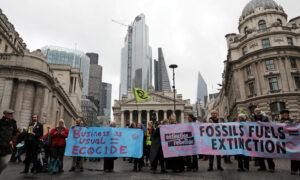Report: Green Lobby Demands Overhaul of Subsidies for Large Wind Farms
However, a critic of net zero policy and wind farms argued that developers should bear some of the project risks themselves, which they believe is fair.
A report by ex-Conservative MP Chris Skidmore’s net zero lobby group suggests that the subsidy system for large wind farm projects needs to be revamped due to the high risks involved.
The report, authored by former energy minister Dan McGrail, called for alternative systems for large renewable energy projects. Mr. Skidmore resigned earlier this year over legislation related to new oil and gas licenses in the North Sea.
Despite this, critics of net zero policy question why the free market has not developed mechanisms to mitigate risks associated with offshore wind projects, suggesting an unlimited appetite for subsidies.
Renewable energy developers typically compete for CfD contracts to ensure a fixed price for electricity sales, providing certainty for project financing. This system is funded through a levy on energy suppliers.
Under the current system, if the fixed price is too low, costs can escalate, leading wind farm companies to withdraw from projects they deem financially unviable.
Offshore Wind
The government aims to have 50 gigawatts of offshore wind capacity installed in the UK by 2030.
The report indicates that developing a 100 megawatt onshore wind farm for a CfD auction could cost around £5 million, while a 100 megawatt solar farm may cost roughly £2 million. The cost of developing an offshore wind farm, regardless of size, is estimated to be between £200 million and £400 million.
It highlights that there is currently a one-size-fits-all approach for CfD auctions, but acknowledges that significant infrastructure projects with high risks may require a different model.
The report also suggests the need for improved finance and tax provisions as certain aspects of the current tax regime create obstacles for renewable energy development.
Last September, a key offshore wind auction failed to attract any new projects, reportedly due to the government setting the maximum price too low.
The Labour party, expected to win the upcoming general election, has pledged in its manifesto to collaborate with the private sector to boost onshore wind, solar power, and offshore wind capacity by 2030.
‘Some of the Risk Should Remain With the Developer’
John Constable, director of the Renewable Energy Foundation, which scrutinizes wind farm expansion, believes that it is fair for developers to retain some project risks.
He points out that the offshore wind industry previously promised significant cost reductions and made low bids for CfD contracts, but these promises have not materialized.
Constable suggests that developers may seek capital grants or tax credits to offset development costs, shifting the risk onto taxpayers.
He emphasizes that, in an inherently uneconomic industry like wind energy, the demand for subsidies is insatiable.
The Epoch Times reached out to Mission Zero Coalition for additional comments.
PA Media contributed to this report.





